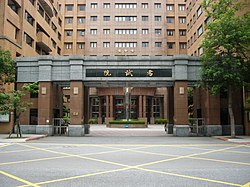| 考試院 Kǎoshì Yuàn (Mandarin) Khó-chhì Īⁿ (Taiwanese) Kháu-sṳ Yen (Hakka) | |
 Logo | |
| Agency overview | |
|---|---|
| Formed | January 1930 |
| Jurisdiction | Republic of China (Taiwan) |
| Headquarters | Wenshan, Taipei |
| Agency executives |
|
| Website | www.exam.gov.tw |
| Examination Yuan | |||||||||||||||||||||||||||
|---|---|---|---|---|---|---|---|---|---|---|---|---|---|---|---|---|---|---|---|---|---|---|---|---|---|---|---|
| Chinese | 考試院 | ||||||||||||||||||||||||||
| Literal meaning | Court of Examinations | ||||||||||||||||||||||||||
| |||||||||||||||||||||||||||
| This article is part of a series on |
 |
|---|
The Examination Yuan is the civil service commission branch in charge of validating the qualification of civil servants of the government of the Republic of China (Taiwan). It has a president, a vice president, and seven to nine members, all of whom are nominated by the president of the republic and confirmed by the Legislative Yuan for four-year terms according to Republic of China laws. [2]

